Review: Musical Theatre West Brings MILLION DOLLAR QUARTET Back to Life in Long Beach
A jukebox musical marked by outstanding live performances, the concert-like show shines with its energetic tribute to four rock n' roll legends.
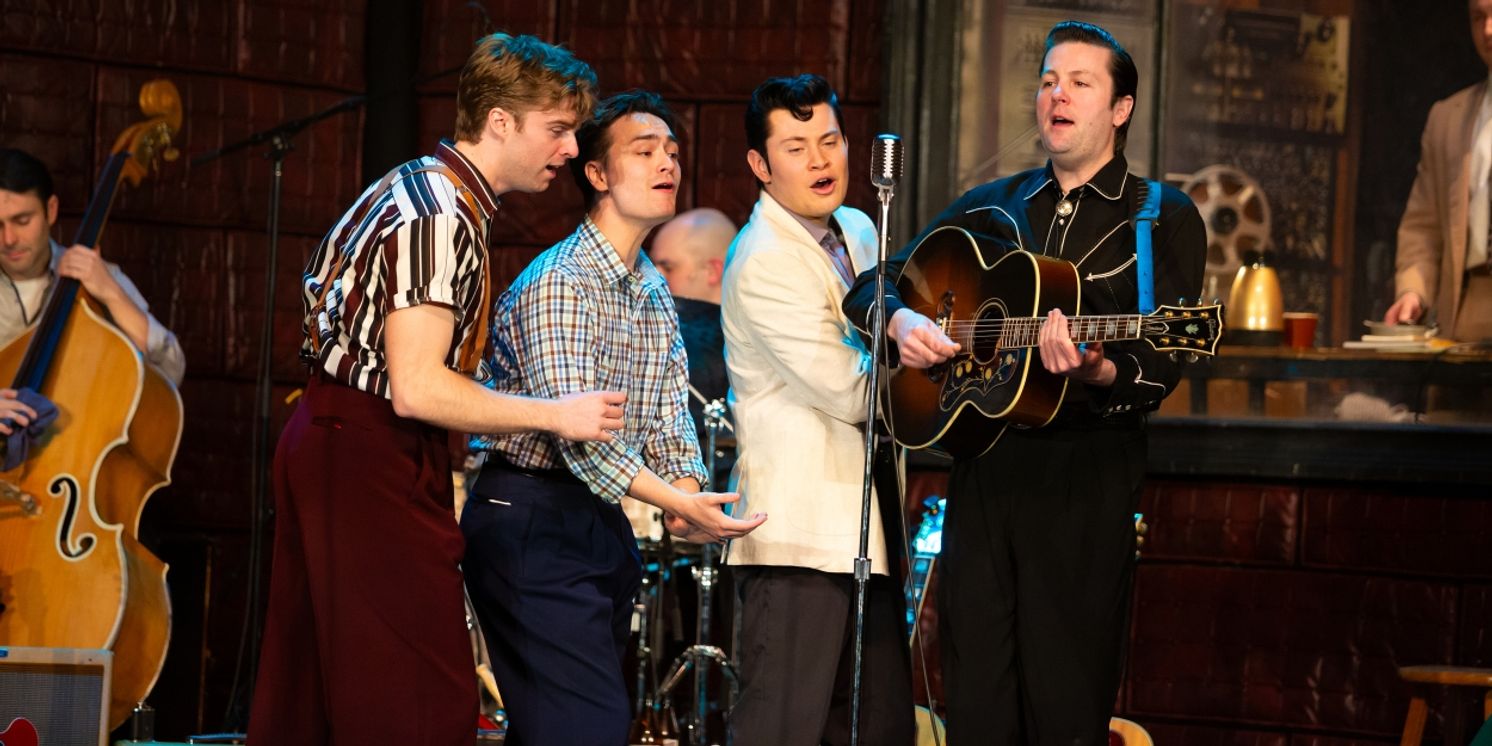
More like one elongated impromptu jam session than your typical stage musical, MILLION DOLLAR QUARTET—the 2010 Tony-nominated Broadway jukebox musical—doesn't involve much of a complex storyline, but it does attempt to imagine what it must have been like to be in the room where music history happened, specifically during one of rock and roll's greatest moments of pure star-alignment that found Elvis Presley, Johnny Cash, Carl Perkins, and Jerry Lee Lewis coming together for a one-night-only recording session.
Inspired by an actual event that occurred on December 4, 1956 at the Sun Records Studio in Memphis, Tennessee, MILLION DOLLAR QUARTET fashions a hits-filled jukebox musical around a remarkably fortuitous get-together. This scenario essentially guarantees that audiences will get to hear nostalgia-baiting, recognizable hit tunes from the aforementioned four stars in blissfully raucous, high-energy succession… sometimes solo, sometimes with each other—and all done with insanely impressive live vocals and instruments performed by the very actors on stage assuming each respective luminary.
That latter fact alone is enough of a raison d'être to see the show, and in the case of Musical Theatre West's brand new regional production of the musical—now continuing through April 28, 2024 at the Carpenter Performing Arts Center in Long Beach—the resulting show doesn't disappoint… at least with that particular trajectory. Proving to be pure, rousingly explosive entertainment, watching MTW's MILLION DOLLAR QUARTET is like experiencing an oldies musical revue on ultra-caffeinated steroids, with the added bonus of a little backstage drama thrown in for some minor, low-stakes context.
All this palpable rock star energy is mostly due—it's hard to deny—to this production's superb, extremely talented cast which includes the pompadour-sporting, hip-swiveling LJ Benet as Elvis Presley; the (appropriately) clad in all-black, deeply-voiced David Elkins Simpson as Johnny Cash; the wily Will Riddle as guitar-riffing Carl Perkins; and the manic, athletically-agile, deliciously country-fried piano-smasher Garrett Forrestal as the young, newly-discovered Jerry Lee Lewis. Not only is this foursome winningly charming in their convincing cosplays of the respective real-life icons they each portray, they also all sing incredibly well (and, yes, did I mention each dude plays their own instruments remarkably as good as their real-life counterparts?).
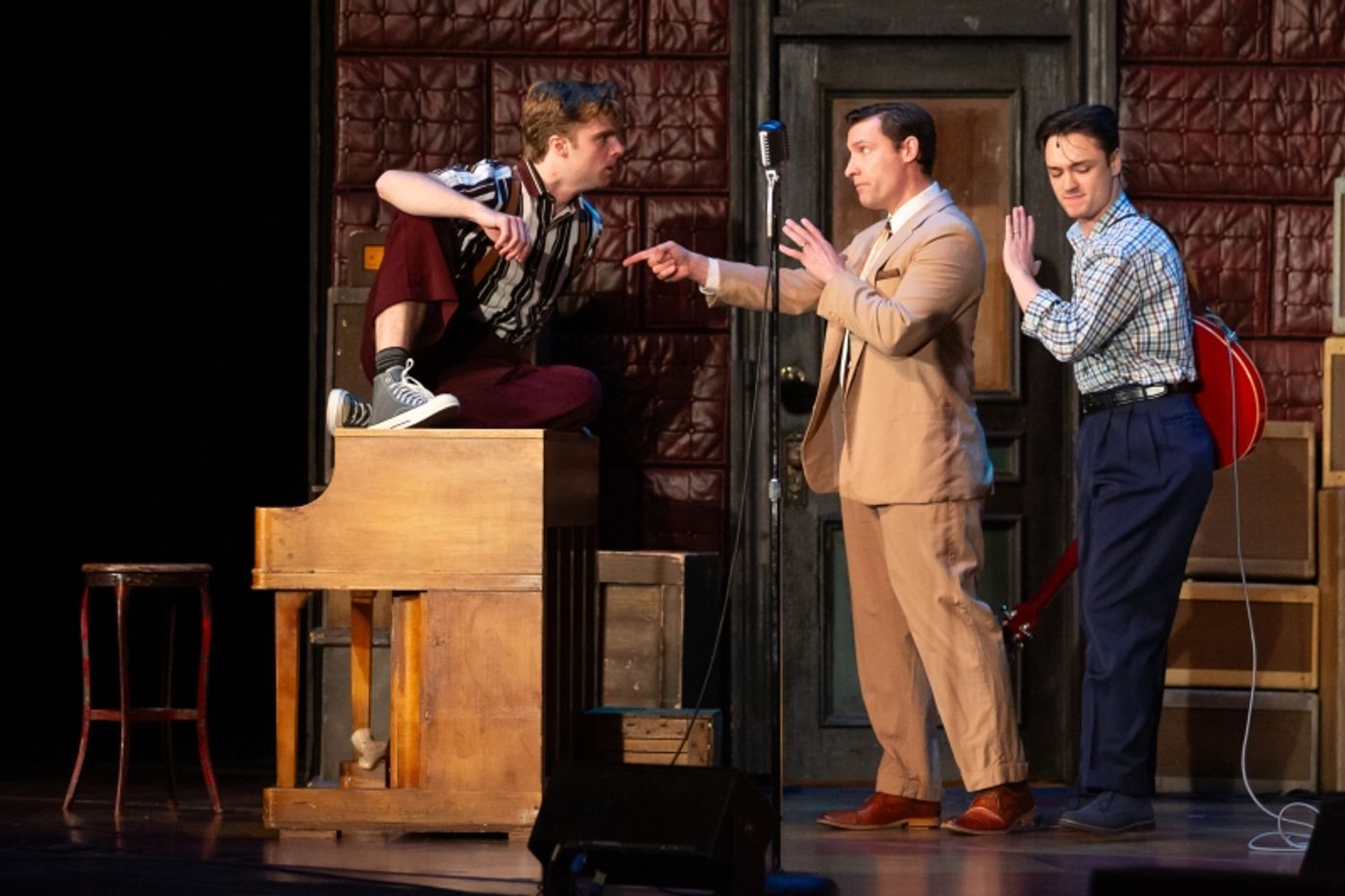
And the awesome cherry on top of this mostly country-rock sundae? Well, thank heavens for the soulful presence of the wonderful Summer Nicole Greer, who comes in to sprinkle some much-needed jazz/R&B icing to this testosterone-fueled rock soundtrack. I have to admit that although her role as Elvis's lady companion Dyanne is pretty much just blatantly inserted in this show as a narrative excuse to have a more feminine voice enter the mix, Greer makes the much-too-brief contrasting role a pleasant, less-raging relief to get. And, frankly, Greer provides two of my favorite vocal moments in the show (full disclosure, I may have been a bit too loudly enthusiastic with my squeals of delight during her first song on opening night, so my apologies to my nearby neighbors).
By the way, after some light research I conducted post-show, it turns out Elvis did bring a lady-friend with him during his Sun Records studio visit that day, but the girl he brought wasn't a singer as she is touted in this musical.
At the exposition-spewing center of MILLION DOLLAR QUARTET—narrating the entire historic event for us citizens in the far-off future watching all of this unfold—is Sun Records' owner and general manager Sam Philips, played with understandably anxious energy by Adam Poole. Speaking from the heart like a proud papa with bills to pay, Philips breaks the fourth wall to reveal that his small, independent record company—the artist-focused creative home where he discovered many of these talents—is his pride and joy, and it might soon fall prey to the bigger, more corporate-backed studios… the kind of record companies that could take rising star Elvis to more repeat visits to the top of the charts without him.
So on this seemingly ordinary but soon-to-be historic day, Philips is crossing his fingers for a miracle. He has lined up an important recording session between his reliably stable in-house singer/songwriter Carl Perkins and his brand-new discovery Jerry Lee Lewis. Unfortunately, the two musicians have clearly opposable personalities and work ethics that clash immediately, which, of course, worries Philips. Perkins—who wrote the song "Blue Suede Shoes" only to see it become a hit for another Sun Records artist, Elvis Presley—is hoping Philips can take this record seriously as a way to make up for that artistic, albeit lucrative swipe. Lewis, meanwhile, is a wildly erratic young newcomer eager to make it big and prove his talent, compounded with aversions to authority and, well, generally just standing still.
But as luck would have it, both Elvis Presley and Johnny Cash have both separately scheduled a visit to the studio to meet with Philips, prompting each to talk—and, well, sing—their talents for the room. I mean, why not… they're already there, why not sing a little bit.
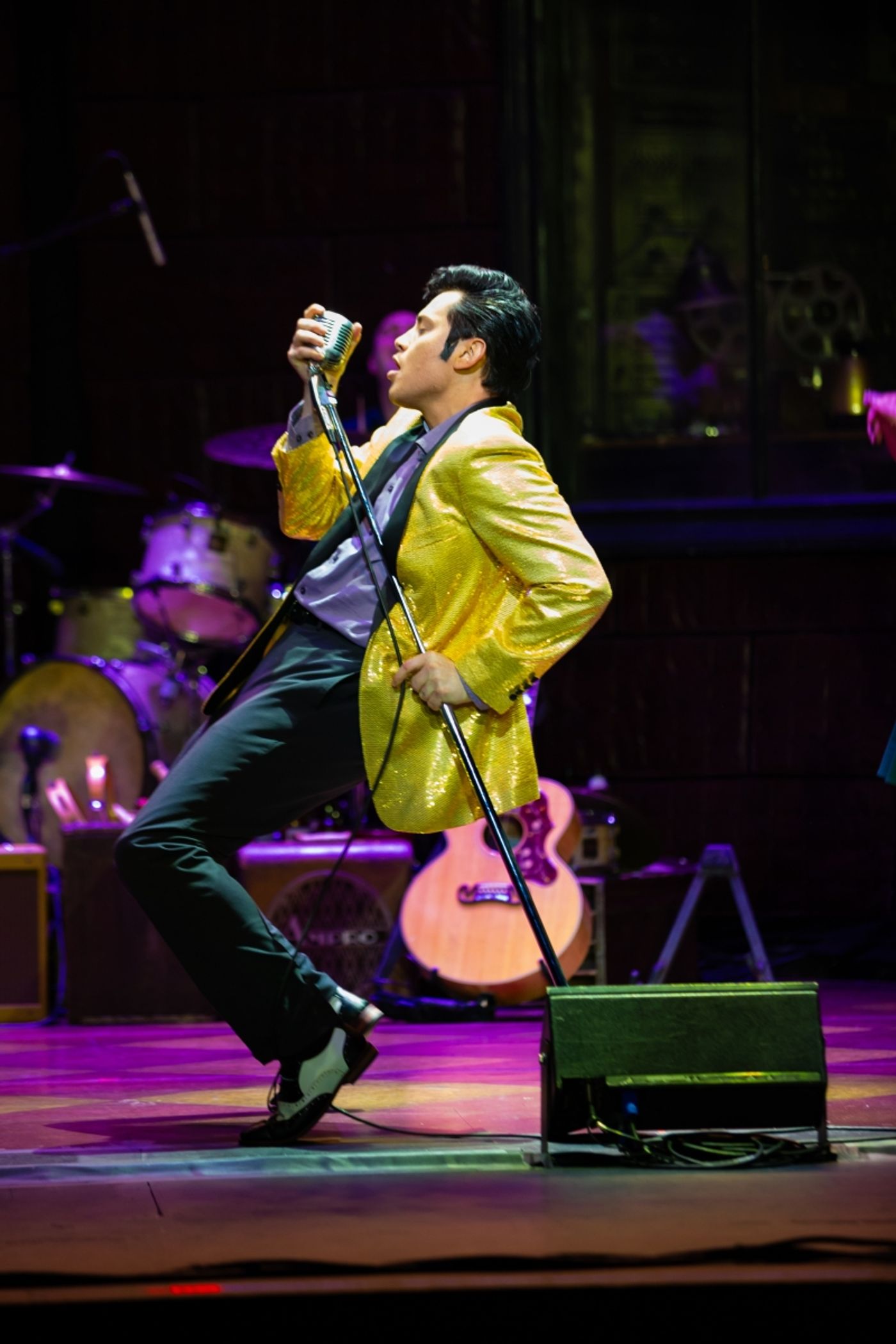
Thinking this foursome's presence in the studio at the same time could result in something magical (sound-wise and, perhaps, hit-wise), Philips urges a jam session, aided by studio musicians Brother Jay (Benny Lipson) on bass and Fluke (Lonn Hayes) on the drums. But the party will soon give rise to some hiccups and revelations that could jeopardize the already shaky future of Sun Records. But, why worry about all that now when we've got these four singing up a storm?
Featuring a serviceable book by Colin Escott and Floyd Mutrux (based on his original concept and direction), MILLION DOLLAR QUARTET successfully (and, perhaps, correctly) distracts from its simple premise set-up by focusing almost all of the action on the performances of the musical numbers themselves. And, my gosh, they are just incredibly well-done in this MTW production.
Helmed by director Tim Seib—who also directed the most recent national tour production of this show as well as similar regional productions at La Mirada and Laguna Playhouse—the production is cranked up to ten for most of its (now) two-act structure (previous productions were done in just one act), placing the audience smack-dab in the middle of all this unbridled musicality, accented by an amped-up nostalgic sound musically-directed by David Lamoureux paired with dazzling visuals from scenic designer Derek McLane and lighting designer Brandon Baruch. If sensory overload is the intended feeling the production is trying to evoke, then it has handily achieved it.
Each of the four stars get each of their early-era hits highlighted with great reverence, and all four co-leads are stellar at it. By virtue of being the most youthful and most outrageous of the bunch, goofball Forrestal easily manages to be the production's instantly likable scene-stealer, but the other three were also quite excellent, respectively. Riddle's Perkins is a spit-fire by design, while the quieter, more serious-toned Simpson—with his deep, shudder-inducing voice—is a great contrast. Benet's Elvis (who has his counter-parts hip swivel down pat) has the regal swagger and voice mannerisms to pull it off.
Meanwhile, the gorgeous-voiced Greer's Dyanne has plenty of endearing, playful sass to hold court with the men, and the actor's casting also adds a welcome, extra deep visual connotation that was not intended in the original production: that, perhaps, an African American woman dating a well-known (white) celeb like Elvis out in public—in the very segregated South of the 1950's—is quite a groundbreaking, revolutionary sight to behold, and that Elvis' fellow musician friends accepted her within their circle without hesitation (for historical context, Elvis' real-life companion that accompanied him in the studio that day was white).
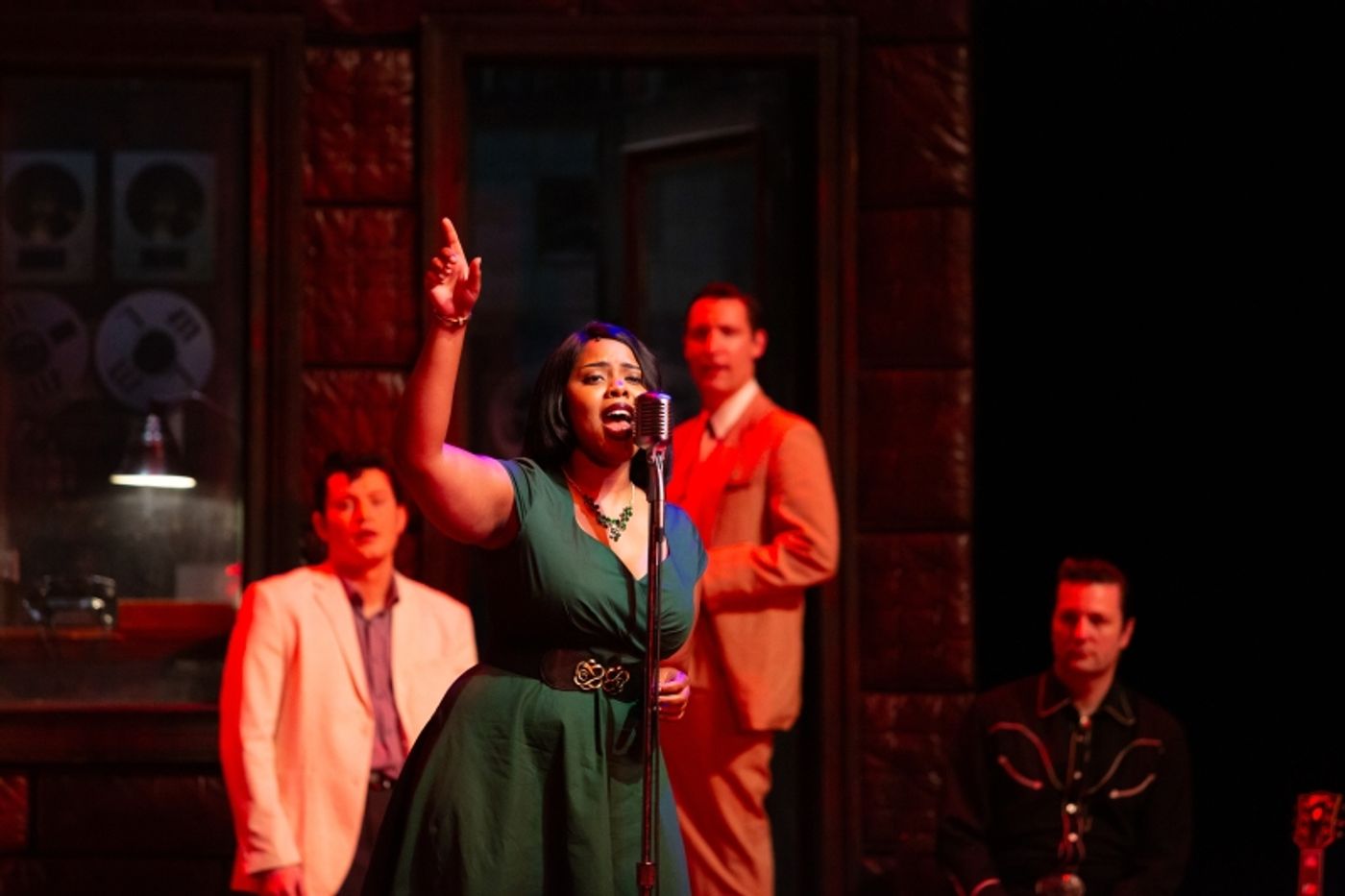
In the same breath, I also appreciate that the show verbally acknowledges (though very briefly) that, perhaps, Elvis' musical stylings was something he, uh, appropriated from the African American musical community to make it more palatable to a mostly white consumer audience.
Musically, there are plenty of exciting stand-out moments, which includes performances of Cash's "Folsom Prison Blues," "I Walk The Line," and "Sixteen Tons," Presley's "That's Alright Mama," "Blue Suede Shoes," and "Hound Dog," Perkins' "Who Do You Love?," and "See You Later Alligator," and Lewis' "Real Wild Child," and "Get Balls of Fire." When the fiery foursome do collaborate in songs like "Down By The Riverside," "Peace in the Valley," and "Let's Have A Party," it is pure magic.
But, yes, admittedly, my faves of the night were actually Greer's Dyanne singing the flirty "Fever" and the feisty "I Hear You Knockin'." She is—and I cannot overstate this enough—phenomenal.
And, this being a jukebox musical, it's almost contractually obligated that the show end with a sort of dance party/sing-along finale to punctuate an evening full of nostalgic retro hits. "Whole Lotta Shakin'" fills that purpose pretty well.
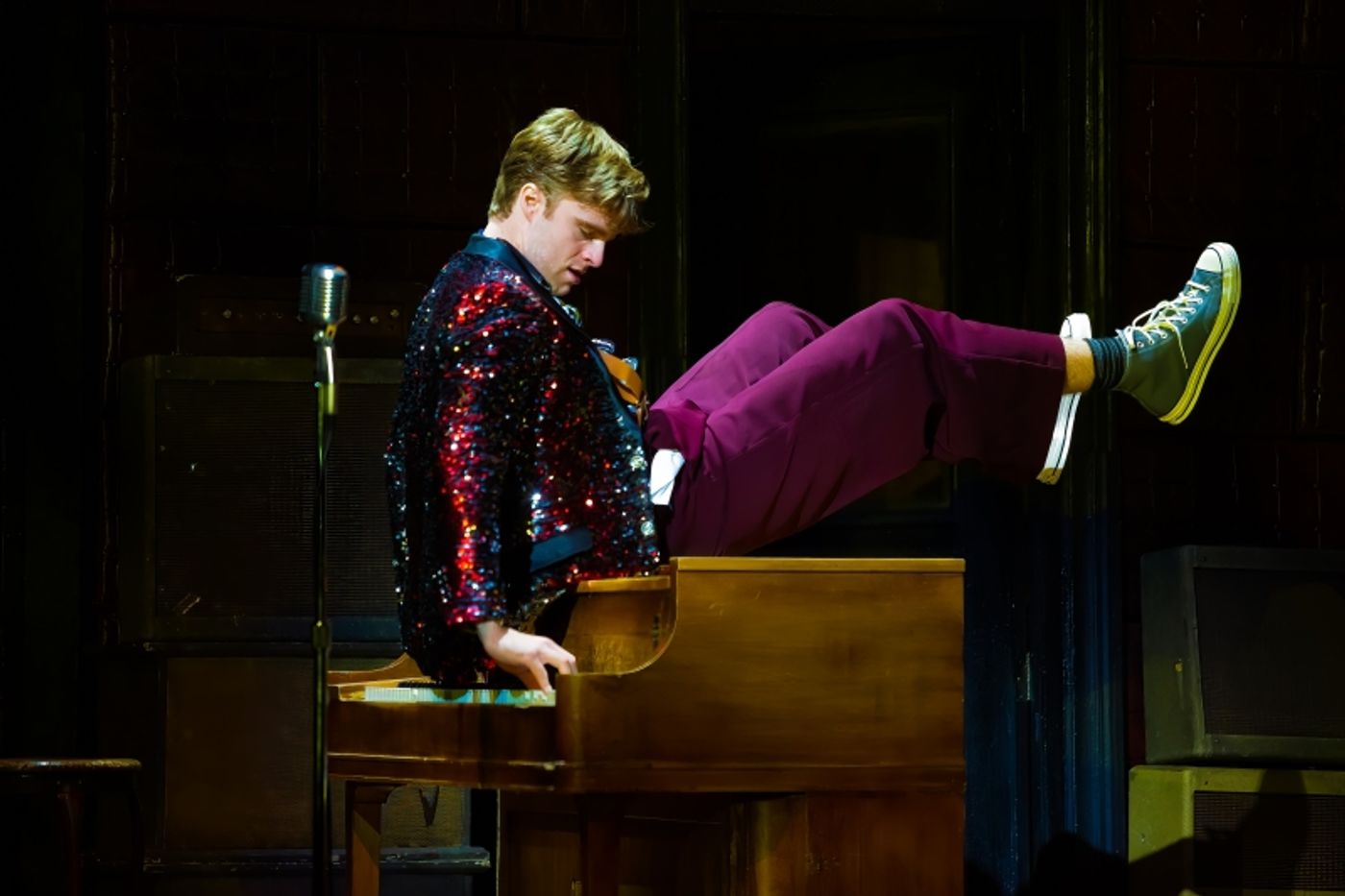
What is actually fairly impressive overall about MTW's MILLION DOLLAR QUARTET is that none of the actors assembled here are doing outright forced impersonations of their famous counterparts—yes, their infamous signature vocal cadence and performance styles are there—but the audience gets enough of an essence from each icon to sell the throwback illusion, especially when each of them starts singing the songs they individually made famous. Coming from someone who doesn't necessarily know a whole lot about this specific era of music, I came out feeling like I saw a live flashback that made me appreciate these legends' contributions to popular music. The mostly concert-like show is a rollicking good time.
Follow this reviewer on TwitterX / Instagram / Threads: @cre8iveMLQ.
Photos courtesy of Musical Theatre West.
---
Performances of Musical Theatre West's production of MILLION DOLLAR QUARTET continue through Sunday, April 28, 2024. The Carpenter Performing Arts Center is located at 6200 E. Atherton Street in Long Beach, CA. For tickets or for more information, please call 562-856-1999 x4 or visit online at www.musical.org.
Reader Reviews
Videos

